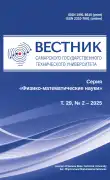Solution of systems of linear Caputo fractional Volterra integro-differential equations using the Khalouta integral transform method
- Authors: Khalouta A.1
-
Affiliations:
- Université Ferhat Abbas de Sétif 1
- Issue: Vol 29, No 2 (2025)
- Pages: 207-219
- Section: Differential Equations and Mathematical Physics
- URL: https://journal-vniispk.ru/1991-8615/article/view/349667
- DOI: https://doi.org/10.14498/vsgtu2141
- EDN: https://elibrary.ru/YHPHPY
- ID: 349667
Cite item
Full Text
Abstract
The Khalouta integral transform is a powerful method for solving various types of equations, including integro-differential equations and integral equations. It can also be applied to initial and boundary value problems associated with ordinary differential equations and partial differential equations with constant coefficients. The main objective of this paper is to derive solutions to systems of linear Caputo fractional Volterra integro-differential equations using the Khalouta integral transform.
To solve such systems using this technique, it is essential to establish and define several key properties of the Khalouta integral transform, which are crucial for deriving the transformation of the Caputo fractional derivative appearing in the systems. Several numerical examples are presented and solved by using the Khalouta integral transform method to demonstrate the applicability of the proposed approach. The results obtained from these numerical examples confirm that the proposed method is highly efficient and provides exact solutions for systems of linear fractional Volterra integro-differential equations in a straightforward manner.
Full Text
##article.viewOnOriginalSite##About the authors
Ali Khalouta
Université Ferhat Abbas de Sétif 1
Author for correspondence.
Email: nadjibkh@yahoo.fr
ORCID iD: 0000-0003-1370-3189
Scopus Author ID: 57210790493
https://www.mathnet.ru/person207700
Lab. of Fundamental Mathematics and Numerical; Dept. of Mathematics; Faculty of Sciences
Algeria, 19000 SétifReferences
- Singh Y., Gill V., Singh J., et al. On the Volterra-type fractional integro-differential equations pertaining to special functions, Fractal Fract., 2020, vol. 4, no. 3, 33. DOI: https://doi.org/10.3390/fractalfract4030033.
- Khan Q., Suen A., Khan H. Application of an efficient analytical technique based on Aboodh transformation to solve linear and non-linear dynamical systems of integro-differential equations, Part. Differ. Equ. Appl. Math., 2024, vol. 11, 100848. DOI: https://doi.org/10.1016/j.padiff.2024.100848.
- Gunasekar T., Raghavendran P. The Mohand transform approach to fractional integro-differential equations, J. Comput. Anal. Appl., 2024, vol. 33, no. 1, pp. 358–371. https://eudoxuspress.com/index.php/pub/article/view/29.
- Matoog R. T., Ramadan M. A., Arafa H. M. A hybrid numerical technique for solving fractional Fredholm–Volterra integro-differential equations using Ramadan group integral transform and Hermite polynomials, Alexandria Eng. J., 2024, vol. 108, pp. 889–896. DOI: https://doi.org/10.1016/j.aej.2024.09.025.
- Dhunde R. R. 3712–3718, Indian J. Sci. Technol., 2024, vol. 17, no. 36. DOI: https://doi.org/10.17485/IJST/v17i36.2005.
- Amin M. B. M., Ahmad S. S. Laplace transform for solving system of integro-fractional differential equations of Volterra type with variable coefficients and multi-time delay, Symmetry, 2022, vol. 14, no. 5, 984. DOI: https://doi.org/10.3390/sym14050984.
- Donolato D. Analytical and numerical inversion of the Laplace–Carson transform by a differential method, Comput. Phys. Commun., 2002, vol. 145, no. 2, pp. 298–309. DOI: https://doi.org/10.1016/S0010-4655(02)00281-3.
- Belgacem F. B. M., Karaballi A. A. Sumudu transform fundamental properties, investigations and applications, J. Appl. Math. Stochastic Anal., 2006, vol. 2006, 91083. DOI: https://doi.org/10.1155/JAMSA/2006/91083.
- Zafar Z. U. A. ZZ transform method, Int. J. Adv. Eng. Glob. Technol., 2016, vol. 4, no. 1, pp. 1605–1611.
- Alwan Z. M. (ZMA)-transform method, J. Interdiscip. Math., 2021, vol. 24, no. 7, pp. 1841–1849. DOI: https://doi.org/10.1080/09720502.2021.1963520.
- Elzaki T. M. The new integral transform “Elzaki Transform”, Glob. J. Pure Appl. Math., 2011, vol. 7, no. 1, pp. 57–64.
- Aboodh K. S. The new integral transform “Aboodh Transform”, Glob. J. Pure Appl. Math., 2013, vol. 9, no. 1, pp. 35–43.
- Belgacem F. B. M., Silambarasan R. Theory of natural transform, Math. Eng. Sci. Aerosp., 2012, vol. 3, no. 1, pp. 99–124.
- Maitama S., Zhao W. New integral transform: Shehu transform a generalization of Sumudu and Laplace transform for solving differential equations, Int. J. Anal. Appl., 2019, vol. 17, no. 2, pp. 167–190, arXiv: 1904.11370 [math.GM]. DOI: https://doi.org/10.28924/2291-8639-17-2019-167.
- Kilbas A. A., Srivastava H. M., Trujillo J. J. Theory and Applications of Fractional Differential Equations, North-Holland Mathematics Studies, vol. 204. Amsterdam, Elsevier, 2006, xv+523 pp. EDN: YZECAT. DOI: https://doi.org/10.1016/s0304-0208(06)x8001-5.
- Khalouta A. A new exponential type kernel integral transform: Khalouta transform and its applications, Math. Montisnigri, 2023, vol. 57, pp. 5–23. DOI: https://doi.org/10.20948/mathmontis-2023-57-1.
- Khalouta A. Khalouta transform via different fractional derivative operators, Vestn. Samar. Gos. Tekhn. Univ., Ser. Fiz.-Mat. Nauki [J. Samara State Tech. Univ., Ser. Phys. Math. Sci.], 2024, vol. 28, no. 3, pp. 407–425. EDN: QNZQSC. DOI: https://doi.org/10.14498/vsgtu2082.
- Kumar P., Qureshi S. Laplace-Carson integral transform for exact solutions of non-integer order initial value problems with Caputo operator, J. Appl. Math. Comput. Mech., 2020, vol. 19, no. 1, pp. 57–66. DOI: https://doi.org/10.17512/jamcm.2020.1.05.
- Aibinu M. O., Mahomed F. M., Jorgensen P. E. Solutions of fractional differential models by using Sumudu transform method and its hybrid, Part. Differ. Equ. Appl. Math., 2024, vol. 11, 100872. DOI: https://doi.org/10.1016/j.padiff.2024.100872.
- Zafar Z. U. A. Application of ZZ transform method on some fractional differential equations, Int. J. Adv. Eng. Glob. Technol., 2016, vol. 4, no. 1, pp. 1355–1363.
- Wazwaz A. M. Linear and Nonlinear Integral Equations. Methods and Applications. Berlin, Springer, 2011, xviii+639 pp. DOI: https://doi.org/10.1007/978-3-642-21449-3.
Supplementary files











